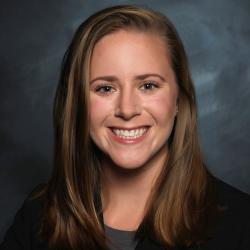Subtle changes can presage a worsening of a chronic condition, but symptoms may not become apparent to a patient until it’s time to call an ambulance.
BioIntelliSense, a Denver-based digital health startup, has developed a wearable sensor meant to monitor patients’ vital signs remotely and provide near real-time data that clinicians can use to identify physiological changes indicating a need for intervention.
The company emerged from stealth Tuesday revealing a strategic partnership with health system UCHealth (not to be confused with the California or Cincinnati UC Health systems), an Aurora, CO-based network of more than a dozen hospitals, plus affiliates in Wyoming and Nebraska that last year notched about 136,000 in-patient admissions and observation visits.
UCHealth, which has a venture fund, is an investor in BioIntelliSense—and the first customer for its BioSticker product: a barbell-shaped device designed to stick to a patient’s chest for 30 days continuously. The device wirelessly sends vital signs and other “medical grade” quality data gathered outside typical hospital confines to BioIntelliSense’s cloud, which in turn transmits it to the health system.
BioIntelliSense is headed by Jim Mault, a serial entrepreneur who started his career as a heart and lung transplant surgeon before shifting into software, where he has focused on creating ways of effectively capturing better patient data.
He spent time at Microsoft (NASDAQ: MSFT), where he worked on the personal health record system HealthVault (which recently shuttered), then started a remote patient monitoring company called HealthyCircles, which San Diego chipmaker Qualcomm (NASDAQ: QCOM) snapped up in 2013. Until founding BioIntelliSense in 2018, Mault served as chief medical officer for Qualcomm Life, its medical device unit (since sold off to private equity firm Francisco Partners).
Mault launched BioIntelliSense with a group of engineers tasked with developing a device that could last long enough to keep down costs and collect data in a way that would allow it to garner FDA clearance. The regulatory agency granted the clearance in December, according to BioIntelliSense. The sensor is designed to last for 30 days, then be tossed; patients who need another would be mailed one in time to replace it. BioIntelliSense provides the sensors free; Mault says systems that use them will be charged per patient per month by BioIntelliSense to collect and deliver the data.
Four primary investors, including German dialysis products and services provider Fresenius, participated in BioIntelliSense’s Series A financing, but Mault wouldn’t say how much the company has raised.
UCHealth in 2016 launched an innovation program called the Care Innovation Center that works with startups to test and commercialize new health tech. So far it has partnered with 15 emerging companies from among more than 500 it has vetted.
When UCHealth connected with BioIntelliSense, it was seeking a tech partner that could provide it with a cost-effective way to monitor patients once outside its hospitals and clinics, said Richard Zane, UCHealth’s chief innovation officer and chairman of emergency medicine at the University of Colorado School of Medicine.
“We have become pretty expert in the concept of surveillance, which means being able to tacitly monitor groups of patients or people and develop prescriptive and predictive algorithms to be able to detect impending illness or worsening illness before it becomes symptomatic or would otherwise have been detected and then intervening,” he said. “That competency of surveillance has been pretty dramatic on the hospital side of our responsibility. … What we were not able to do is develop the ability to do surveillance in the home or in a skilled nursing facility.”
Intervening before a patient reaches the symptomatic stage can keep them from reaching that acute stage—and any associated hospital admissions, he said.
The BioSticker tracks vital signs such as resting heart rate, respiratory rate and skin temperature, as well as other biometrics, including coughing and body position. UCHealth is working with a big tech company—Zane wouldn’t didn’t disclose which—to take that data and present it in ways that’s helpful to the health care providers who will be monitoring it.
“What we believe that allows us to do is to identify patients who are in-patient and discharge them sooner because we will still be able to surveille them while they’re at home, [and] to surveille certain patient populations who are at risk for acute exacerbations of chronic disease,” he said.
Zane says UCHealth will start off using BioStickers with patients who are being discharged with chronic conditions, including diabetes, heart failure, emphysema, and complex neurological conditions. Another group slated to get the sensors is some patients who have some degree of chronic disease and are scheduled for a significant surgery, to help physicians determine which may be good candidates for prehab, a regimen of exercise meant to prepare people to bounce back better from an operation.
BioIntelliSense is among a slew of companies leveraging advances in cloud computing, computing power, and advanced algorithms to develop tools intended to improve healthcare. CB Insights in October identified the top-funded digital health in each state, and determined that those companies alone had collectively raised $8.6 billion in equity funding. And UCHealth is among a number of health systems and hospitals partnering up with tech firms to enhance their services.
Companies competing to be the remote monitor and data provider of choice to the health care ecosystem include consumer tech firms such as FitBit (NYSE: FIT) and Apple (NASDAQ: AAPL). San Jose, CA-based Vital Connect, like BioIntelliSense, has received FDA clearance for its sensor, which can last up to five days.
Mault says BioIntelliSense stands apart from the competition with its device’s ability to continuously track vital signs for 30 days, a first for a single-use medical device, according to the company. Timing, as well as tech advances, has made the business possible, he adds: The Centers for Medicare & Medicaid Services, which administers the federal Medicare insurance program, began covering what it refers to as remote physiological monitoring on Jan. 1.

